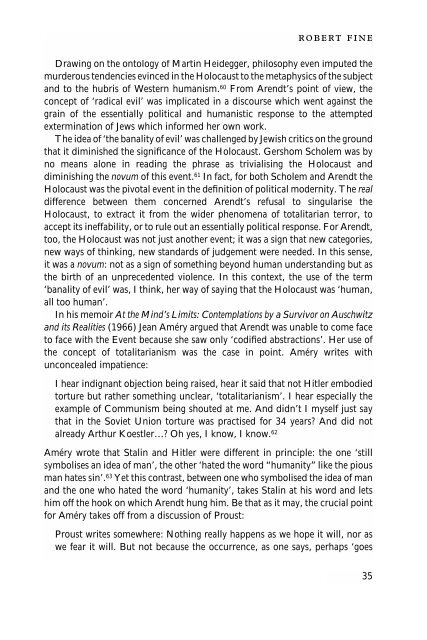You also want an ePaper? Increase the reach of your titles
YUMPU automatically turns print PDFs into web optimized ePapers that Google loves.
obert fine<br />
Drawing on <strong>the</strong> ontology of Martin Heidegger, philosophy even imputed <strong>the</strong><br />
murderous tendencies evinced in <strong>the</strong> <strong>Holocaust</strong> to <strong>the</strong> metaphysics of <strong>the</strong> subject<br />
and to <strong>the</strong> hubris of Western humanism. 60 From Arendt’s point of view, <strong>the</strong><br />
concept of ‘radical evil’ was implicated in a discourse which went against <strong>the</strong><br />
grain of <strong>the</strong> essentially political and humanistic response to <strong>the</strong> attempted<br />
extermination of Jews which informed her own work.<br />
The idea of ‘<strong>the</strong> banality of evil’ was challenged by Jewish critics on <strong>the</strong> ground<br />
that it diminished <strong>the</strong> significance of <strong>the</strong> <strong>Holocaust</strong>. Gershom Scholem was by<br />
no means alone in reading <strong>the</strong> phrase as trivialising <strong>the</strong> <strong>Holocaust</strong> and<br />
diminishing <strong>the</strong> novum of this event. 61 In fact, for both Scholem and Arendt <strong>the</strong><br />
<strong>Holocaust</strong> was <strong>the</strong> pivotal event in <strong>the</strong> definition of political modernity. The real<br />
difference between <strong>the</strong>m concerned Arendt’s refusal to singularise <strong>the</strong><br />
<strong>Holocaust</strong>, to extract it from <strong>the</strong> wider phenomena of totalitarian terror, to<br />
accept its ineffability, or to rule out an essentially political response. For Arendt,<br />
too, <strong>the</strong> <strong>Holocaust</strong> was not just ano<strong>the</strong>r event; it was a sign that new categories,<br />
new ways of thinking, new standards of judgement were needed. In this sense,<br />
it was a novum: not as a sign of something beyond human understanding but as<br />
<strong>the</strong> birth of an unprecedented violence. In this context, <strong>the</strong> use of <strong>the</strong> term<br />
‘banality of evil’ was, I think, her way of saying that <strong>the</strong> <strong>Holocaust</strong> was ‘human,<br />
all too human’.<br />
In his memoir At <strong>the</strong> Mind’s Limits: Contemplations by a Survivor on Auschwitz<br />
and its Realities (1966) Jean Améry argued that Arendt was unable to come face<br />
to face with <strong>the</strong> Event because she saw only ‘codified abstractions’. Her use of<br />
<strong>the</strong> concept of totalitarianism was <strong>the</strong> case in point. Améry writes with<br />
unconcealed impatience:<br />
I hear indignant objection being raised, hear it said that not Hitler embodied<br />
torture but ra<strong>the</strong>r something unclear, ‘totalitarianism’. I hear especially <strong>the</strong><br />
example of Communism being shouted at me. And didn’t I myself just say<br />
that in <strong>the</strong> Soviet Union torture was practised for 34 years? And did not<br />
already Arthur Koestler…? Oh yes, I know, I know. 62<br />
Améry wrote that Stalin and Hitler were different in principle: <strong>the</strong> one ‘still<br />
symbolises an idea of man’, <strong>the</strong> o<strong>the</strong>r ‘hated <strong>the</strong> word “humanity” like <strong>the</strong> pious<br />
man hates sin’. 63 Yet this contrast, between one who symbolised <strong>the</strong> idea of man<br />
and <strong>the</strong> one who hated <strong>the</strong> word ‘humanity’, takes Stalin at his word and lets<br />
him off <strong>the</strong> hook on which Arendt hung him. Be that as it may, <strong>the</strong> crucial point<br />
for Améry takes off from a discussion of Proust:<br />
Proust writes somewhere: Nothing really happens as we hope it will, nor as<br />
we fear it will. But not because <strong>the</strong> occurrence, as one says, perhaps ‘goes<br />
35

















